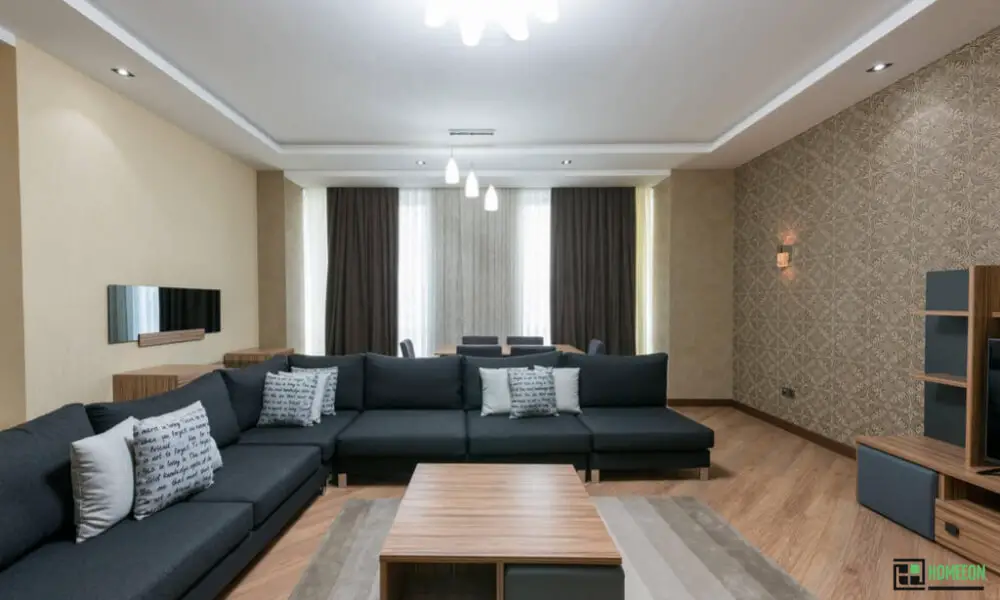Last Updated on July 16, 2023 By Emma W. Thomas
Leaving furniture in an apartment when moving out can have several consequences. Firstly, the landlord or property management may charge a fee for furniture removal, cleaning, or disposal. The cost can vary depending on the terms of the lease agreement. Additionally, abandoned furniture can create inconveniences for the next tenant, who may be unable to use the space as intended. It can also lead to potential damage to the furniture itself if left unattended.
What Happens When A Tenant Leaves Furniture In A House When Moving Out?

Moving out of a rented property can be a stressful task, but leaving behind furniture adds another layer of complexity. If you find yourself in this situation, it’s essential to understand the potential consequences and responsibilities involved. In this listicle, we explore what happens when a tenant leaves furniture behind when moving out.
- Landlord Assessment: The landlord or property owner will assess the situation and determine how to handle the abandoned furniture.
- Communication: The landlord may contact the tenant to inquire about the furniture and discuss the appropriate course of action.
- Storage: In some cases, the landlord may provide storage options for the furniture, but this is not guaranteed, and there may be associated fees.
- Removal: If the tenant does not claim the furniture or make arrangements for its removal, the landlord may dispose of it.
- Cost Recovery: The landlord may charge the tenant for any costs incurred in removing or disposing of the furniture.
- Damage Assessment: The condition of the furniture and any damage caused by its abandonment may be documented and potentially deducted from the tenant’s security deposit.
Tips On What To Do If A Tenant Leaves Furniture In A House When Moving Out.
If it is stated in the lease that the tenant is required to leave the house in its original condition, then it will be illegal for the tenant to leave any form of furniture in the house. In other terms, the instructions on the lease may not have been explained or covered if the tenant is allowed or not allowed to leave furniture. As a landlord, the following steps will help to handle this matter.
1. Inspect The House On The Completion Of A Lease
This will help you determine and take an inventory of the number, size, and types of furniture left behind by the tenant. Photos can also come in handy as a sign of proof, together with the necessary documentation.
2. Determine Why The Tenant Left
This step comes in when the landlord has walked through the house and has found some left furniture. There are three main explanations as to why a tenant left the house:
1. The Ending Of A Lease Or A Termination Notice By The Tenant
In this state, the landlord is free to handle the furniture in any way as long as the tenant has communicated that they have permanently left the house.
2. The Landlord Gave The Tenant A Termination Notice
Here, the landlord is also free to handle the furniture as long as communication is made.
3. The Tenant Is Evicted/ Disappearance Of The Tenant
In matters relating to eviction, the landlord has no right whatsoever to take the handling of the property into their hands. Therefore, it is advised that the landlord should seek Local Law Enforcement Management to know the way forward. Documentation is also required.
3. Secure Storage
In an encounter where a new tenant is required to move into the house, it is advised that as the landlord, you should make sure the furniture is securely stored even if the tenant has communicated. You can decide to use your garage or get a safe storage unit. It is also essential to witness, especially a close neighbor when moving the furniture to the desired storage area. It is also essential to record all the expenses used during the moving of the furniture.
4. Contact The Tenant

There are two main reasons for contacting the Tenant: The first reason is a case where a new tenant wants to move into the house immediately; the landlord can contact the tenant to know when the furniture will be cleared. The second way is when no tenant moves into the house, but the landlord wants the house cleared.
The tenant can also be contacted to be notified of the moving of the furniture, where they are stored, the expenses and the price or fee of storage, and the maximum storage time.
If the tenant does not communicate after the designated time, the landlord is allowed to either sell, keep, donate, or trash them as long as all the rules or laws have been followed.
As a landlord, you are advised to have an abandoned furniture clause in the lease agreement to avoid future inconveniences. The clause should include:
- What will be considered an abandoned furniture
- How long you will be able to keep the furniture under storage following property and personal laws
- How much the tenant will be required to pay as the disposal or storage fee
- How do you expect to receive the disposal or furniture storage fee
- What measures you will take if the tenant does not cooperate
Why Do People Leave Their Furniture Behind?
Moving to a new place can be an exciting and daunting experience. One common phenomenon that often puzzles people is how previous occupants or tenants leave their furniture behind. Why would anyone leave behind their belongings? Here are five possible reasons why people leave their furniture behind:
- Cost and Time Constraints:
Moving can be an expensive and time-consuming process. Some individuals and families might find it more cost-effective or convenient to leave their furniture behind instead of incurring the expenses and effort of packing, transporting, and unpacking it in their new place. This is particularly true when the furniture is old, worn out, or doesn’t match the new style they want to achieve.
- Downsizing:
When moving to a smaller space, downsizing becomes a necessity. In such cases, individuals may have to leave their furniture behind as it no longer fits or is practical for the new place. Downsizing could result from various factors, such as a change in financial situation, becoming empty nesters, or simply a desire to simplify their lifestyle. Leaving furniture behind enables people to lighten their load and start fresh in their new space.
- Incompatibility with the New Space:
Sometimes, the layout or design of the new place may not accommodate the furniture from the previous home. It could be due to differences in size, style, or functionality. Rather than trying to force their old furniture into a space where it doesn’t fit or look appropriate, some individuals decide to leave it behind and explore new options that better suit the new environment.
- Shifting Trends and Personal Preferences:
Interior design trends evolve over time, and people’s personal preferences change as well. What once seemed stylish and trendy might now feel outdated and unappealing. Some individuals see moving as an opportunity to revamp their living space and replace their old furniture with new pieces that reflect their evolved tastes and current design trends. Leaving old furniture behind becomes necessary to achieve the desired aesthetic.
- Estate Settlements and Inherited Furniture:
In situations where someone inherits a property or apartment, they may find themselves with furniture that doesn’t align with their taste or needs. In such cases, the inherited furniture may not hold sentimental value, and the new owner might choose to leave it behind when moving in favor of their own belongings. This allows them to create a space that feels more personal and suits their preferences.
Frequently Asked Questions
1. Is It Illegal To Leave Furniture In A House When Moving Out?
This will depend on the agreement between the tenant and the landlord. If it is against the lease agreement, the tenant should sue for no form of furniture left in the house when moving out. If uncertain, communication with the landlord should be made.
2. What Will Happen If I Leave Furniture In The House When Moving Out?
The landlord may have to report you against the lease agreement. You will be charged as it is against the law. If there was no instance where there was any law forbidding leaving furniture when moving out, then you should communicate with the landlord to avoid mishandling the furniture if you had not abandoned them in the first place.
3. Can You Leave Furniture In A House When You Move Out?
This depends on whether it is right or wrong and whether you have had prior communication with the landlord. If you intend to leave furniture, make sure it is not against the lease agreement rules.
4. Can You Leave Unneeded Furniture In A House When
Yes, you can. This is if you are willing to pay the total cost of disposal, removal, and storage fee. Transportation costs may also come in. As long as you will not need the furniture in the future and you have already communicated with the landlord and are willing to take up the costs, you are very safe.
5. What Are Some Of The Consequences Of Leaving Furniture In A House When Moving Out?
1. Furniture destruction when moving the furniture to a storage unit
2. Additional costs such as transportation, removal and disposal costs, and even storage costs
3. Charges if you would have gone against the lease agreement laws where you are prohibited from leaving any form of furniture in the house
4. Loss of some of the furniture when they are being transported to the storage unit
Final Word
As a landlord, you may be uncertain about the actions to take once the furniture has been left in your house. It is better to seek confirmation from the tenant before taking any other action. It is also advisable that you go through the lease laws to be sure of the steps you will have to take. When moving out, it is essential to go through the lease agreement to know if it is legal or illegal to leave needed or unneeded furniture in the house. If you are still unsure what to do, it is advised that you communicate with the landlord on the way forward. If you are still unsure, it is better to go through the state laws for further guidance. Many avoidable charges and costs can come with leaving the furniture in the house, and it is, therefore, better for the tenant to be sure. If the tips mentioned above are followed, you are assured to be on the safer side either as a tenant or landlord.
References:
https://lettiandco.com/what-happens-if-i-leave-furniture-in-my-apartment/
https://www.avail.co/education/articles/can-tenants-leave-items-behind-when-moving-out
Emma is a graduate of Domestic Science or Family and Consumer Sciences (Home Economics) from the University of Wisconsin. She has 7 years of experience Working with the strategic section of BestBuy and now writing full-time for Homeeon.
From Managing the Home, Interiors, Cleaning, and Exteriors to Gardening and everything about Making A Home Liveable – is her passion and this Homeeon is the result of this.
Emma loves decorating her home with the best stuff found online. She cares about quality over anything and writes reviews about them here in Homeeon. Get in touch with her over Pinterest.
Keep reading her blogs.

